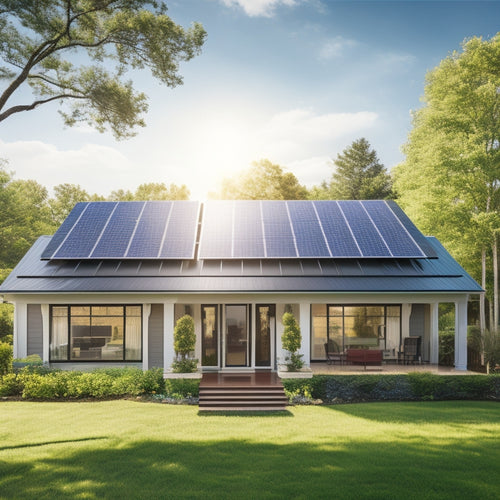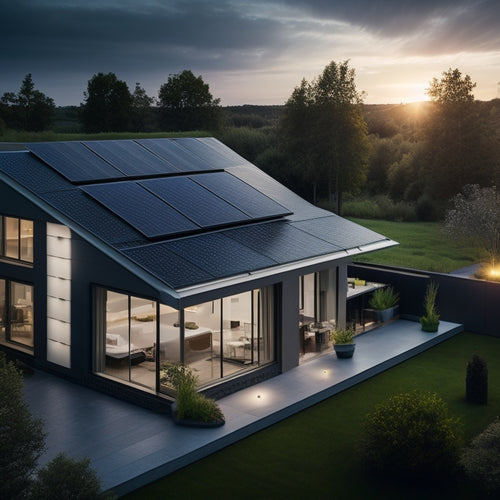
Solar Battery Backup Price
Share
When considering a solar battery backup system, you can expect to pay between $10,000 and $20,000 or more, depending on the capacity, type, and quality of the equipment, as well as the complexity of the installation. The cost is influenced by factors such as the type of battery, inverter efficiency, and the system's ability to match your load size and energy storage needs. With a solar battery backup system, you'll gain a reliable source of power during outages, guarantee your home remains comfortable and secure, and reduce your reliance on utility companies. As you investigate your options, you'll uncover more about how these systems can benefit your home.
The Essentials
- Solar battery backup prices vary depending on system size, battery type, and installation costs, ranging from $10,000 to $20,000 or more.
- Energy storage needs and load size impact system design and pricing, with smaller systems sufficing for essential appliances and larger for full home power.
- Upfront costs are higher than traditional generators, but long-term benefits, financial incentives, and reduced energy bills enhance affordability.
- Battery technology and capacity influence pricing, with lithium-ion batteries being more expensive than lead-acid batteries but offering better performance.
- Installation costs, which take a few days, are factored into the overall price, with maintenance and monitoring essential for optimal system performance.
Reliable Power During Outages
You expect your solar battery backup system to provide power when you need it most - during outages and emergencies. A reliable backup system guarantees you have electricity when the grid goes down, keeping your home or business running smoothly.
By providing a continuous power supply for essential systems like medical equipment and security systems, you can secure the safety and well-being of your family Reliable Power Storage.
Additionally, a solar battery backup system safeguards your family's comfort by keeping lights, internet, and communication devices powered on. With a solar battery backup, you'll have a steady supply of power during emergencies, minimizing disruptions to your daily life.
Power When You Need
During extended grid outages, a solar battery backup system provides reliable power when it's needed most, ensuring your home remains comfortable and secure.
You'll have peace of mind knowing that your lights, refrigeration, and essential appliances will continue to function, even when the grid is down.
With a solar battery backup system, you'll experience energy independence, reducing your reliance on the grid and the utility company's whims.
By providing a cost-effective alternative to traditional Emergency Backup Solar Power systems, you'll also reduce your reliance on fossil fuels and lower your utility bills over time.
When the sun shines, your solar panels will generate electricity and charge your batteries.
During the night or on cloudy days, your batteries will provide power, ensuring a seamless changeover.
This means you'll enjoy cost savings by reducing your energy consumption from the grid.
Plus, you'll avoid the hassle and expense of fueling generators or relying on noisy, polluting backup power sources.
With a solar battery backup system, you'll have the power when you need it, whenever you need it.
Backup During Emergencies
Solar battery backup systems prove their worth in emergency situations, providing reliable power when the grid fails. You can't predict when a natural disaster or utility outage will strike, but with a solar battery backup system, you'll be prepared. This system installation guarantees you have power when you need it most, keeping your essential appliances running and your family safe.
With a reliable battery backup for home, you can prevent food spoilage and maintain safety, while also keeping essential devices powered and operational.
In the face of emergency, you'll appreciate the independence and security a solar battery backup system provides. It's an important aspect of emergency preparedness, allowing you to maintain control and comfort in your home.
Imagine having lights, refrigeration, and communication during an extended outage – it's a transformative solution.
With a solar battery backup system, you can rest easy that your home will remain powered, even when the grid is down. This means you can focus on more pressing concerns, like the well-being of your loved ones, rather than worrying about your power supply.
Clean Energy During Emergencies
You need a reliable emergency power source that can provide clean energy during emergencies, and solar battery backup systems fit the bill.
They offer an affordable solution to power outages, with prices ranging from off grid solar battery cost to solar panel battery backup system price(https://www.illchanter.com).
With a solar battery backup, you can store excess energy generated by your solar panels during the day for use at night or during power outages.
This reliable energy storage solution guarantees you have a steady supply of electricity when you need it most.
Emergency Power Source
Approximately 70% of households experience power outages every year, leaving them without access to essential appliances and lights. That's where an emergency power source comes in - a reliable backup system that provides clean energy during emergencies.
With solar technology, you can have a consistent power supply, even when the grid goes down.
When considering a solar battery backup system, you'll want to compare costs with traditional generators. While the upfront cost may be higher, the long-term benefits and environmental impact make it a worthwhile investment.
The installation process typically takes a few days, and with proper system maintenance, your battery will last for years to come. You'll have a choice of battery types, each with its own advantages and disadvantages.
Financial incentives, such as tax credits and rebates, can help offset the cost. And, with grid independence, you'll have peace of mind knowing you're not reliant on the grid.
Safety considerations are also key, as solar battery backup systems are designed with safety features to protect you and your family.
Don't just take our word for it - user testimonials rave about the freedom and security that comes with having a reliable emergency power source.
Reliable Energy Storage
During power outages, reliable energy storage is essential to guarantee a steady supply of clean energy to your home. You need a system that can store excess energy generated by your solar panels during the day, so you can use it when the grid goes down. This is where solar battery backup systems come in, providing you with energy independence and a reliable source of power.
A smart grid-ready solar battery backup system allows you to store excess energy generated by your solar panels and use it when you need it most. This means you can power critical appliances like refrigerators, lights, and medical equipment during extended power outages.
With a reliable energy storage system, you're not at the mercy of the grid, and you can enjoy a steady supply of clean energy even when the power is out.
Inverter Efficiency Matters Most
When you're evaluating a solar battery backup system, you need to pay attention to the inverter's efficiency, as it directly impacts your maximum power output.
It's crucial to take into account the entire energy storage system, including batteries, charge controllers, and mounting systems, to guarantee seamless integration and peak performance renewable energy storage.
A higher efficiency inverter guarantees that more of the energy stored in your batteries is converted into usable power for your home.
Look for an inverter with a high energy conversion ratio to minimize energy loss and maximize your system's performance.
Maximum Power Output
Most solar battery backup systems can deliver a maximum power output between 5,000 to 10,000 watts, depending on the inverter's efficiency.
You'll want to take into account this when designing your system, as it directly affects your peak performance and overall solar efficiency. The right inverter can help you achieve maximum output, ensuring you get the most out of your renewable energy source.
When choosing a solar battery backup system, look for one that integrates seamlessly with your existing grid infrastructure, providing you with grid independence when you need it.
A well-designed system should also include advanced energy management capabilities, allowing you to optimize your energy usage and balance your load effectively. This means you'll be able to power your essential appliances during an outage, without sacrificing performance.
In addition, modern battery technology has increased power density, making it possible to store more energy in a smaller footprint.
Energy Conversion Ratio
With your solar battery backup system, the energy conversion ratio plays a critical role in determining the overall efficiency of your setup. This ratio measures how effectively your inverter converts DC power from your solar panels or battery into usable AC power for your home.
A higher energy conversion ratio means your system can produce more power while wasting less energy as heat.
When shopping for a solar battery backup system, look for an inverter with a high energy conversion ratio. This is especially important if you want to maximize your energy efficiency and reduce your reliance on the grid.
Advanced conversion technology can achieve ratios of 95% or higher, ensuring you get the most out of your solar power. A high-efficiency inverter can also help you save money on your energy bills and reduce your carbon footprint.
Capacity Matches Your Load
When sizing a solar battery backup system, you need to evaluate the capacity that matches your load.
The load size matters because it directly affects the energy storage needs of your system. For instance, if you're looking to power your home during outages, at night, or whenever the grid is down, you'll want to investigate home energy storage solutions that cater to your specific needs.
You'll want to calculate your peak power requirements to determine the suitable battery capacity that can provide the necessary backup power during outages.
Load Size Matters
A crucial factor in determining your solar battery backup price is the load size, which directly corresponds to the capacity you need. You'll want to calculate the total wattage of the appliances and devices you want to power during an outage. This will help you determine the required capacity of your solar battery backup system.
Your load size will influence the type and number of batteries you need, as well as the installation costs. For instance, if you only want to power a few essential appliances like lights and refrigerators, a smaller battery bank with a lower capacity may suffice.
However, if you want to power your entire home, you'll require a larger battery bank with a higher capacity, which will increase your overall costs.
Different battery types, such as lithium-ion or lead-acid, also have varying capacities and price points. Understanding your load size will help you choose the right battery type and configuration for your needs, ensuring you get the most efficient and cost-effective system.
Energy Storage Needs
You'll need to match your energy storage needs to your load size, guaranteeing your solar battery backup system can provide the required power during an outage. This means considering your energy usage patterns, including peak demand and daily consumption.
As solar technology advances and energy trends shift towards renewables, it's crucial to choose a battery solution that meets your specific needs. Battery innovations, such as lithium-ion and flow batteries, offer varying degrees of efficiency and cost-effectiveness.
A thorough market analysis will help you determine the best capacity for your system, balancing installation costs with long-term savings. Additionally, consider maintenance tips, environmental impact, and financing options to guarantee a seamless integration with the grid.
Efficiency standards, such as those set by the International Electrotechnical Commission (IEC), will also play a role in selecting the right battery solution.
Longer Cycle Life Guaranteed
When you invest in a solar battery backup system, you're likely thinking about the long-term benefits.
A longer cycle life guarantee guarantees you get the most out of your system, and you can expect a battery lifespan extension of up to 10-15 years or more.
This extended lifespan translates to more consistent power supply and reduced replacement costs over time.
Battery Lifespan Extension
With solar battery backup systems, every additional cycle count matters, as it directly impacts the overall lifespan of the battery. You want to maximize the number of charging cycles to get the most out of your investment.
To achieve this, it's essential to focus on battery maintenance, ensuring your system operates within the ideal temperature range and is protected from extreme weather conditions. Durability factors, such as the quality of materials and construction, also play a significant role in extending the battery's lifespan.
Technology advancements have led to more efficient charging systems, reducing wear and tear on the battery. When considering cost, remember that a longer-lasting battery may require a higher upfront investment, but it will reduce your environmental impact and save you money in the long run.
Performance monitoring and regular maintenance can help identify potential issues before they become major problems. By following proper installation tips and taking advantage of warranty options, you can enjoy a seamless user experience and maximize your solar battery backup system's lifespan.
Frequently Asked Questions
How Long Does a Solar Battery Backup System Typically Last?
You'll find that a solar battery backup system typically lasts around 10-15 years, depending on the battery lifespan, which is measured in discharge cycles, with most batteries offering 3,000-5,000 cycles, ensuring your energy independence for years to come.
Can I Use My Existing Solar Panel System With a Battery Backup?
You can likely use your existing solar panel system with a battery backup, depending on solar panel compatibility and available battery storage options, ensuring a seamless integration for maximum energy independence and freedom.
Are Solar Battery Backup Systems Eligible for Government Incentives?
You can take advantage of incentive programs and tax credits when installing a solar battery backup system, which can greatly reduce your upfront costs, giving you more freedom to invest in your energy independence.
Do Solar Battery Backup Systems Require Regular Maintenance?
You'll be interested to know that 90% of solar battery backup system failures are preventable with proper maintenance. To maximize your system's lifespan, you'll want to perform routine checks, ensuring connections are secure, and batteries are balanced, thereby optimizing overall performance.
Can I Monitor My Solar Battery Backup System's Performance Remotely?
You can easily monitor your solar battery backup system's performance remotely, tracking its energy production, storage, and consumption in real-time, giving you total control and freedom to optimize its performance from anywhere, at any time.
Final Thoughts
As you weigh your solar battery backup options, remember that a few hundred dollars more upfront can mean the difference between a few hours of power and days of reliability during outages. While a cheaper option might be tempting, it's the high-efficiency inverter and longer cycle life that will truly give you peace of mind when the grid goes down. Invest in a quality solar battery backup system, and you'll be trading darkness for light - literally.
Related Posts
-

The Role of Battery Monitoring Systems in Renewable Energy
Battery monitoring systems play an essential role in renewable energy by enhancing system longevity and optimizing pe...
-

Home Solar Installation Cost
You're considering installing solar panels on your home, and the upfront cost is likely the biggest hurdle standing i...
-

Home Solar Battery
You're opting for a home solar battery that allows you to utilize the power of the sun during the day and use it at n...


